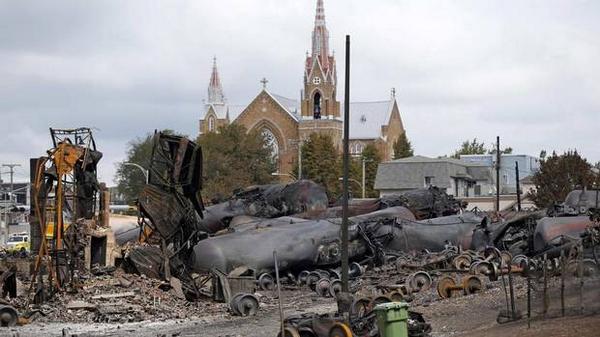Over the past year we have seen innumerable photographs and extensive film footage of the devastation in the small Quebec town of Lac Megantic. A runaway train with a cargo of nearly eight million litres of highly flammable crude oil rumbled into the heart of community when the majority of residents were asleep and when the tank cars began to explode and burn both lives and property were lost. The image of unidentified keys above belonging to one of the persons who perished is a much more intimate reminder that 47 died without warning and so many more were plunged into grief. For me this photo is heartbreaking.

Earlier this week two reports were issued assessing the disaster and multiple causes were named. The Transportation Safety Board pointed an official finger at the safety standards of the company which owned the train. Both reports, along with the union for rail workers, and Greenpeace took Transport Canada to task as well. The expressed concern that there is not enough enforcement of regulations governing the movement by rail of dangerous materials. We all use fossil fuels and there is no fool-proof method of processing and transportation, but we entrust government to ensure the health and wellbeing of our environment.
While Lac Megantic deserves high-profile attention, and those who suffered catastrophic loss deserve answers, this situation is one aspect of the much broader concern about how our various levels of government protect humans and the environment in general. There will always be the temptation of industry to cut corners for the sake of higher profit.
Many of us have growing concerns that the quality of air, and our water, along with the safety of our neighbourhoods have become secondary to the interests of industry. Whether it is the Northern Gateway pipeline in B.C., or waterways through First Nations territory near the Oil Sands, or rail lines carrying hazardous goods through hundreds of other Canadian communities, we need to know that our best interests are the primary goal of those we elect.
We also have an obligation as individuals and collectively, including faith communities, to be informed and to flap our gums, and hold officials accountable for the greater good. Vague assurances just aren't good enough and neither is indifference on our part. Not long ago I tweeted a photo of a train with scores of tanker cars moving through downtown Belleville. I sent is as I waited on my bicycle for it to pass. What was in that train, and do we have the right to know?
While this may not seem like "gospel" if we interpret this word narrowly, Christ came as Good News incarnate, the source of abundant life. We have an obligation to the owner of those keys to do our best for a world made whole.
Thoughts?
You are absolutely right - but we need to know where and when to "flap our gums", to be effective ....
ReplyDeleteIt is the ongoing challenge, isn't it Judy? Perhaps a greater concern that whether we are effective is whether we're faithful. I try to keep at it, even when I'm not sure which way to go.
ReplyDelete